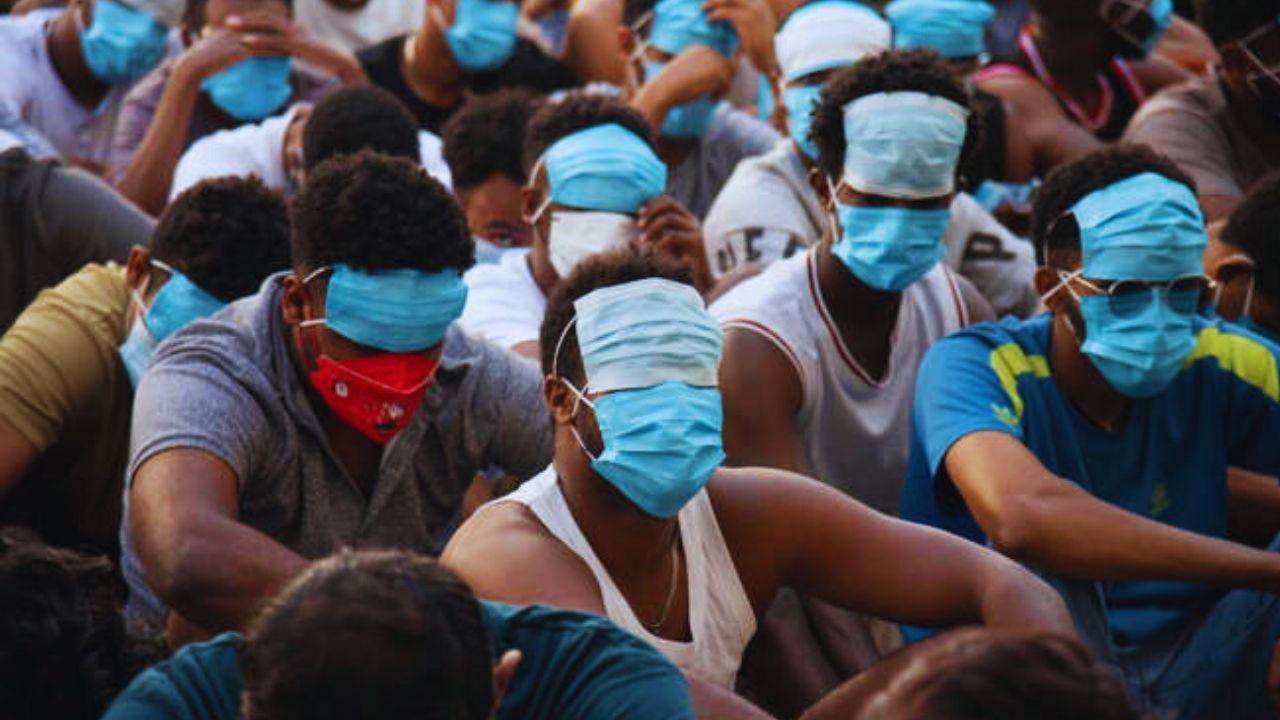Thousands of exhausted and frightened young men and women from around the world sit shoulder to shoulder in overcrowded facilities along the Myanmar border. Surgical masks cover their faces as they endure harsh conditions, waiting for an uncertain future.
Their ordeal was supposed to be over.
Last month, a highly publicized operation by Thai, Chinese, and Myanmar authorities freed over 7,000 individuals from scam compounds in Myanmar, where they had been forced to deceive victims worldwide. But instead of being sent home, they now find themselves trapped in detention centers with no medical care, limited food, and no clear timeline for repatriation.
One Indian man said around 800 detainees share 10 filthy toilets, with many suffering from fevers and persistent coughs. Like other survivors who spoke anonymously to The Associated Press, he feared for his safety.
“If we die here due to health issues, who will be responsible?” he asked.
Both armed groups holding the detainees and Thai officials claim they are waiting for home governments to take action.
While this is one of the largest rescues of forced laborers in recent history, advocates warn that efforts to dismantle the cyber scam industry have resulted in a worsening humanitarian crisis. These released detainees represent only a fraction of the estimated 300,000 people still trapped in similar scam operations across the region. Without significant international action, the networks running these schemes will continue to operate.
A Large-Scale Crackdown
Many of the detainees are well-educated and fluent in English. They were initially lured to Thailand with job offers, only to be trafficked to Myanmar and locked inside buildings where they were forced to work up to 16 hours a day. Those who resisted faced beatings, starvation, or electric shocks.
“You lose your passport, you can’t leave, and it becomes a living hell,” said a Pakistani man still trapped inside.
The scam industry flourished during the pandemic, costing Asia an estimated $18 billion to $37 billion in 2023 alone. Governments did little to stop its expansion—until Beijing intervened.
China pressured Thailand and Myanmar to take action after a Chinese actor was trafficked to Myanmar under false promises of an acting job. His girlfriend’s viral social media campaign led to his rescue, triggering diplomatic action. In response, Thailand cut power, internet, and gas to five border towns in Myanmar, prompting armed ethnic militias in the region—the Kayin Border Guard Force (BGF) and the Democratic Kayin Buddhist Army (DKBA)—to release thousands of detainees.
From Forced Labor to Detention
Instead of gaining freedom, those released found themselves in indefinite detention just across the border.
Most are held in military camps controlled by the Kayin BGF or repurposed scam compounds. Conditions remain dire—detainees sleep on the floor in unsanitary facilities with minimal food and water. At one point, over 7,000 people were crammed into these sites while China repatriated its citizens.
Exclusive AP photos show detainees huddled together, their faces almost entirely covered by surgical masks, under the watchful eyes of armed guards.
“It felt like a blessing to escape, but now, all we want is to go home,” said a 24-year-old Indian man, speaking on a smuggled phone. Like others, he asked for anonymity due to safety concerns.
Tensions have escalated. Last week, fights broke out between detained Chinese citizens and their security guards. Myanmar authorities claim to be holding nationals from 29 countries, including the Philippines, Kenya, and the Czech Republic.
Stuck Over a $600 Plane Ticket
Thai authorities say they cannot allow detainees to cross into Thailand unless they can be sent home immediately. However, many remain stranded as their governments fail to act.
China has arranged chartered flights, but other governments have been slow to respond. Some detainees, like 130 Ethiopians, are stuck in Thai military bases simply because they cannot afford a $600 plane ticket. Indonesians were recently transported to Bangkok to fly home, but such efforts remain limited.
Thai officials met with foreign embassies this week, pledging to process detainees “as quickly as possible,” though the number of people allowed to enter Thailand has dropped from 500 to 300 per day. Embassy staff will now be permitted to visit detainees inside Myanmar.
“The ministry recognizes the urgency of this crisis, particularly the need to repatriate the sick,” said Nikorndej Balankura, spokesperson for Thailand’s Ministry of Foreign Affairs.
The Indian Embassy in Bangkok did not respond to requests for comment. The Czech Foreign Ministry stated it is monitoring the situation but cannot confirm whether a Czech citizen is among those detained.
Aid is Scarce
Assistance for the detainees has been minimal, with only a few small nonprofit organizations stepping in to help.
At a small shelter in the Thai border town of Mae Sot, Acts of Mercy International provides escapees with food, water, and a place to rest. However, director Amy Miller says the sheer number of people needing help is overwhelming.
“When we’re talking about thousands of people, even governments struggle to process, house, and feed them,” Miller explained. “A global response is needed.”
The situation has been made worse by a recent halt in U.S. foreign aid funding. The United Nations’ International Organization for Migration (IOM) previously supported victims of human trafficking in Cambodia but was forced to suspend operations in January due to a funding freeze.
“It’s heartbreaking to see so many people in desperate need of help,” said Saskia Kok, head of IOM’s Protection Unit in Thailand.
A Bigger Issue
Experts estimate that 50 million people worldwide are trapped in modern slavery, yet mass rescues remain rare. Previous cases include the 2015 liberation of 2,000 enslaved fishermen in Indonesia and the rescue of 163 Chinese nationals from forced labor at a Brazilian factory site last year.
Joe Freeman, a researcher at Amnesty International, criticized governments for failing to act sooner.
“What’s happening at the Thai-Myanmar border is the result of years of inaction,” Freeman said. “Many victims were simply seeking better opportunities but were tricked and trafficked.”
Advocates stress that survivors should not be criminalized for being forced to commit fraud under duress. However, in some cases, repatriated individuals have faced prosecution upon returning home.
Business as Usual
Despite the crackdown, experts warn that scam operations continue largely unaffected.
Thai authorities have cut power and internet to scam hubs multiple times, but the criminals adapt—using diesel generators and satellite internet services like Starlink to stay operational.
Additionally, some of the armed groups that participated in the recent crackdowns have been accused of running scam compounds themselves. The EU and UK have sanctioned Kayin BGF leader General Saw Chit Thu for profiting from human trafficking. Activists also claim the DKBA controls several scam centers.
“There’s pressure on the Border Guard Force to act, so they’re making a show of helping people leave,” said Benedikt Hoffman of the UN Office on Drugs and Crime. “But this may just be a shift in their business model.”
No major prosecutions have taken place, and the scam industry continues.
“This hasn’t changed anything,” said a 23-year-old Pakistani detainee. “The bosses are rich and have everything they need to keep operating.”








.svg)



.jpg)
.jpg)